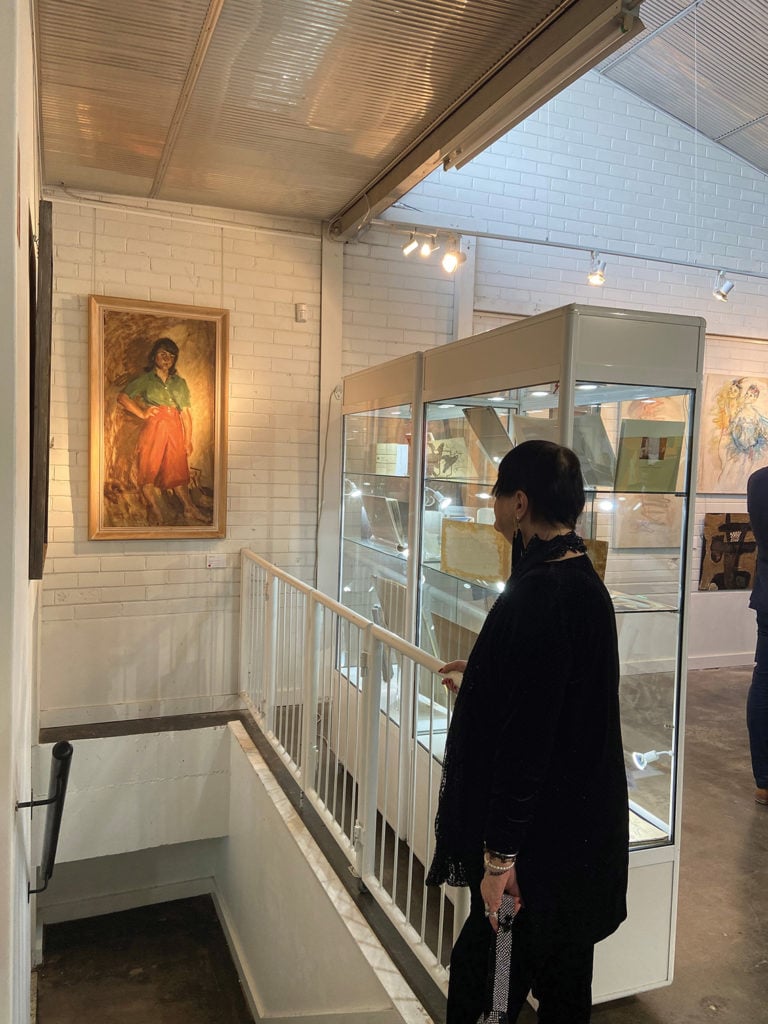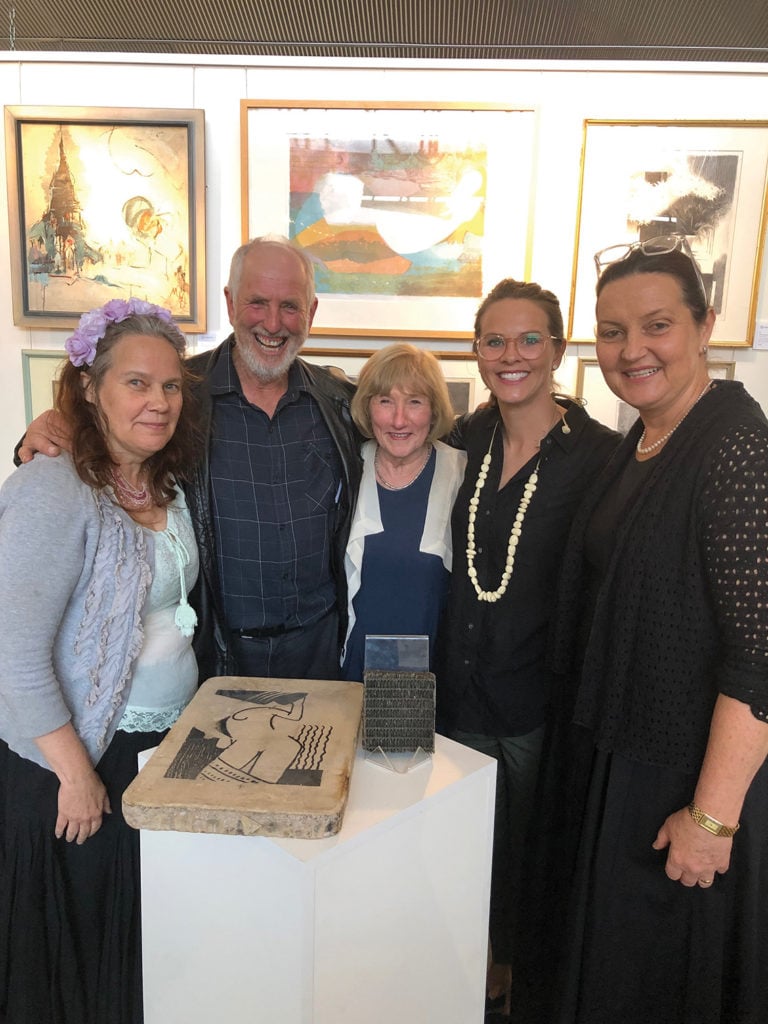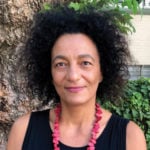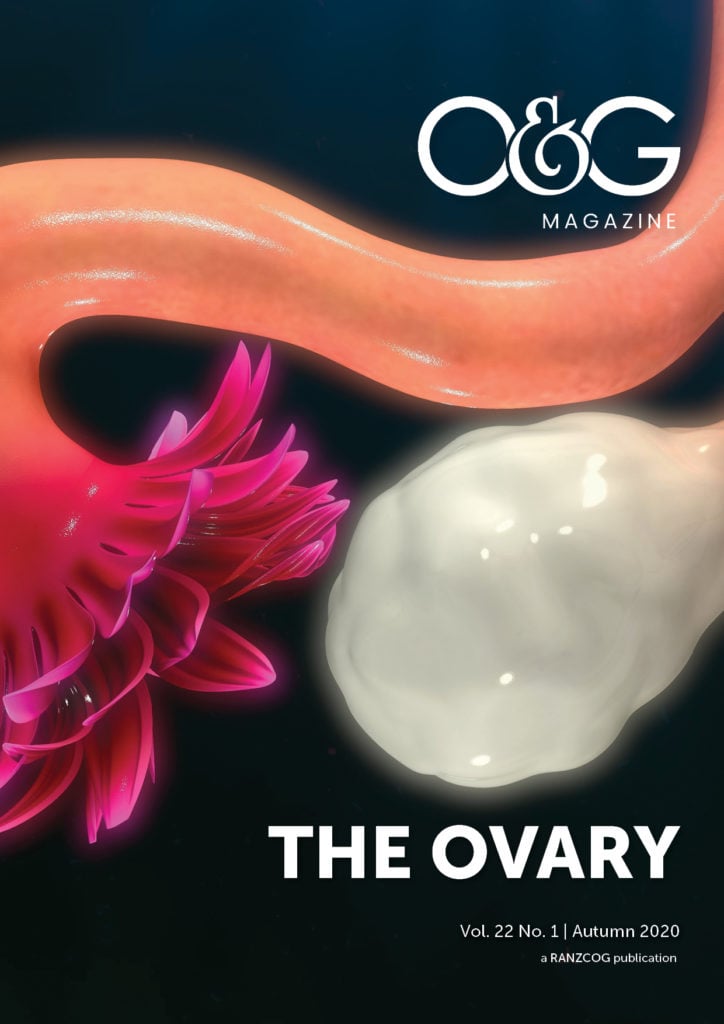There is an innate ambition in some people to leave the world a better place than they found it and so it is instinctive that science and philanthropy should often meet and become natural partners.
On 11 December 2019, guests, via invitation of RANZCOG and Gibson’s Gallery in Armadale, arrived on a warm night at 6pm to attend the opening of The Jack & Mary Courier Selling Exhibition. A large crowd, dressed for an ‘occasion’, gathered upstairs in a large warehouse gallery to witness the generosity of an artist, the late Auguste John (Jack) Courier, who served science through his art.
Jack Courier was born in 1915 and died in 2007. The RANZCOG Women’s Health Foundation was the beneficiary of a generous bequest from Jack, which included a range of his own works, as well as pieces by other accomplished artists including his late wife, Mary Courier McLeish, Peter Jacobs and Kenneth Jack. There were hundreds of etchings, drawings, prints and major works on canvas that had been in storage, and which Jack had trusted to the RANZCOG Women’s Health Foundation.
It was a responsibility that could not be taken lightly; a duty to preserve the work and promote the legacy of Jack, so that his work, his bequest, could be appreciated for generations to come.
For more than 70 years, RANZCOG has shown a commitment to improving the health of women and their families. RANZCOG Women’s Health Foundation, the philanthropic arm of RANZCOG, is dedicated to fostering clinical and scientific research in women’s health, supporting global health projects and promoting Aboriginal and Torres Strait Islander and Māori women’s health initiatives.
It was also Jack’s intention that the RANZCOG Women’s Health Foundation support a perpetual scholarship, dedicated to the memory of Mary, who died from cervical cancer. In 2008, the Mary Elizabeth Courier Research Scholarship was established. It was with great care, hard work and consideration that the RANZCOG Women’s Health Foundation was able to honour Jack’s bequest through a selling exhibition.
Guests enjoyed the wine and champagne as they were invited to tour the gallery and buy artworks. There where hundreds of pieces lining the walls. Jack’s work, a mix of standing figures, landscapes and still lifes, adorned a feature wall. European in influence, romantic in appearance, they were simply stunning.
The intention of the evening was, of course, to sell the work, with proceeds going back into the Foundation. It wasn’t long before red dots began to appear below the paintings (indicating the sale of an artwork), making it apparent that the night was already a success. There were 19 works sold on the night and several more are expected to go at auction early this year.
An evening where artists were honoured and tributes were paid, it was also a night of reunion. Old friends from Caulfield Tech, now Monash University, found each other and exchanged stories. Family of Jack and Mary reunited and reminisced, friends of the artists identified painted settings, scenes and sketches. Pictured below, we also see the daughter of Mary Courier McLeish brought to tears as she marvelled over a forgotten portrait, painted more than 80 years ago. Now 92, she was 12 at the time. The night was a reunion for many of Jack’s friends and for those who were taught lithography by him in 1969.

Figure 1. Mary Courier’s daughter admires a portrait of herself as a young girl, painted by her mother.
There were three speakers at the gallery, with Dr Rebecca Mitchell welcoming guests on behalf of the RANZCOG Women’s Health Foundation. She reminded us of the importance of philanthropy and how it plays a significant role in our society by providing opportunities and championing projects and endeavours. Dr Mitchell spoke about the Pacific Island Cervical Cancer Screening Initiative (PICCSI), for which she volunteers her time and expertise. This particular project has been supported by Jack’s generous bequest.
Women are one of the greatest assets in the Pacific. Losing mothers, daughters, sisters and aunts to cervical cancer impacts the sustainable development of these communities and countries. The aim of PICCSI is to screen women in the Pacific for the virus that causes cervical cancer – Human papillomavirus (HPV); this is very similar to how women are screened in Australia and many parts of the world. Most cervical cancer is preventable, yet available data for Pacific Island countries shows alarming incidence rates. When women test positive for the virus, they are offered a small procedure as treatment. The PICCSI Project screens and treats women on the same day at a health service close to their home. This helps to decrease the number of women who are lost between getting results and receiving treatment, and subsequently, the number of women who go on to develop cervical cancer.
Peter Jacobs, fellow artist, old friend, colleague and confidant, spoke after Dr Mitchell. He recalled the technical and often arduous process involved in bringing Jack’s work to life, illustrating the mastery behind lithography. He told us that when Jack was satisfied with an image, he would lock himself away for weeks to print an edition. Each colour in the print was drawn separately, proofed and then printed. There were times when it was a one-colour print, where he would complete the image on just one stone, against a white paper surface. This process evident in one of his famous prints, The Black Standing Figure.
Peter recently oversaw a collection of Jack’s works at the National Gallery of Australia, where a portrait of Jack hangs. He reiterated a conversation he had with Roger Butler, a senior curator at the national gallery, who said that ‘Jack is arguably Australia’s finest stone lithographer whose place in Australian printmaking history is now fully recognised.’

Figure 2. Posing with one of Jack’s lithography stones. From left to right: Dr Juliette Peers, Peter Jacobs, Cathie Stocky, Dr Rebecca Mitchell and Jenny Gibson.
Dr Juliette Peers, a postgraduate supervisor, senior researcher at RMIT and author of More Than Just Gumtrees, talked about Jack’s soulmate and fellow artist, Mary Courier McLeish, whom he met later in life and married. Mary was an accomplished artist in her own right. Dr Peers spoke to the crowd about the period in which Mary painted, and the Melbourne Society of Women Painters and Sculptors founded in the late 1800s. They were the seldom-heard voices of women artists and craftworkers, amateur and professional, radical and conservative and provided us with personal, social and artistic history. Mary Courier McLeish was indeed a trailblazer for her time, with many of her works finalists of the prestigious Archibald Prize.
Philanthropy itself means the love of humanity and is thus exclusively carried out with the greater good in mind. The latest fire devastations have helped us to understand the importance of charity. It is immediate, often short-term, and focused primarily on rescue and relief. The Women’s Health Foundation centres on philanthropy. It is much more long-term, more strategic and focused on rebuilding. Philanthropic donations play an indispensable role in supporting early-stage basic research, often being a catalyst for the establishment of major research centres and initiatives. The contribution of philanthropy is unique, complementary to other funding sources, and incredibly valuable for scientific research.
We, as friends and supporters of the community at RANZCOG, came together to pay homage to both Jack and Mary’s work in a way that will not be forgotten. It was also an evening where guests came to pay tribute to Jack’s philanthropic bequest, where audiences were informed, asked questions and shared stories. An evening for us all to cherish.
If you wish to purchase a piece of Courier artwork, please contact Jennifer Gibson at Gibson’s Gallery.
e: [email protected]
t: 0413 202 520
You can view the Jack and Mary Courier Collection on their website: www.gibsonsauctions.com.au/jack-and-mary-courier-collection
To find out more about the PICCSI project you can go to any of these sites:
www.youtube.com/channel/UCzxJ05bNPTWN1F9taQURa4w
https://piccsi.org/who-we-are/
www.healthserve.org.au/projects-of-health-serve-australia/142-articles/101-women-s-health-project-fiji.html
For more information regarding The Mary Elizabeth Courier Research Scholarship, or if you wish to donate or discuss leaving a bequest to RANZCOG, please contact:
RANZCOG Women’s Health Foundation Coordinator, Ms Leigh Craig
e: [email protected]
t: +61 9412 2993






Leave a Reply